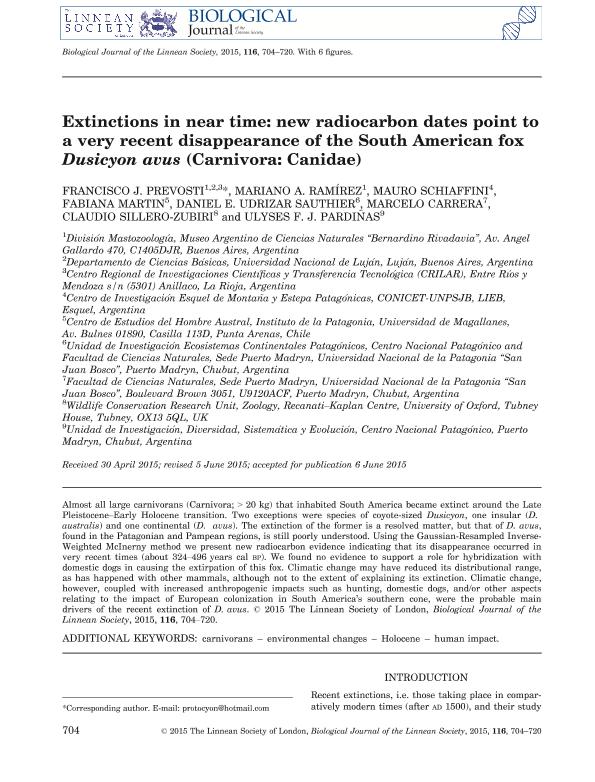Artículo
Extinctions in near time: new radiocarbon dates point to a very recent disappearance of the South American fox Dusicyon avus (Carnivora: Canidae)
Prevosti, Francisco Juan ; Ramirez, Mariano Andres
; Ramirez, Mariano Andres ; Schiaffini, Mauro Ignacio
; Schiaffini, Mauro Ignacio ; Martin, Fabiana Maria; Udrizar Sauthier, Daniel Edgardo
; Martin, Fabiana Maria; Udrizar Sauthier, Daniel Edgardo ; Carrera, Marcelo; Sillero-Zubiri, Claudio; Pardiñas, Ulises Francisco J.
; Carrera, Marcelo; Sillero-Zubiri, Claudio; Pardiñas, Ulises Francisco J.
 ; Ramirez, Mariano Andres
; Ramirez, Mariano Andres ; Schiaffini, Mauro Ignacio
; Schiaffini, Mauro Ignacio ; Martin, Fabiana Maria; Udrizar Sauthier, Daniel Edgardo
; Martin, Fabiana Maria; Udrizar Sauthier, Daniel Edgardo ; Carrera, Marcelo; Sillero-Zubiri, Claudio; Pardiñas, Ulises Francisco J.
; Carrera, Marcelo; Sillero-Zubiri, Claudio; Pardiñas, Ulises Francisco J.
Fecha de publicación:
11/2015
Editorial:
Wiley Blackwell Publishing, Inc
Revista:
Biological Journal of The Linnean Society
ISSN:
0024-4066
Idioma:
Inglés
Tipo de recurso:
Artículo publicado
Clasificación temática:
Resumen
Almost all large carnivorans (Carnivora; > 20 kg) that inhabited South America became extinct around the Late Pleistocene–Early Holocene transition. Two exceptions were species of coyote-sized Dusicyon, one insular (D. australis) and one continental (D. avus). The extinction of the former is a resolved matter, but that of D. avus, found in the Patagonian and Pampean regions, is still poorly understood. Using the Gaussian-Resampled Inverse-Weighted McInerny method we present new radiocarbon evidence indicating that its disappearance occurred in very recent times (about 324–496 years cal BP. We found no evidence to support a role for hybridization with domestic dogs in causing the extirpation of this fox. Climatic change may have reduced its distributional range, as has happened with other mammals, although not to the extent of explaining its extinction. Climatic change, however, coupled with increased anthropogenic impacts such as hunting, domestic dogs, and/or other aspects relating to the impact of European colonization in South America's southern cone, were the probable main drivers of the recent extinction of D. avus.
Palabras clave:
Canidae
,
Extinctions
,
Human Impact
,
Climatic Changes
Archivos asociados
Licencia
Identificadores
Colecciones
Articulos(CIEMEP)
Articulos de CENTRO DE INVESTIGACION ESQUEL DE MONTAÑA Y ESTEPA PATAGONICA
Articulos de CENTRO DE INVESTIGACION ESQUEL DE MONTAÑA Y ESTEPA PATAGONICA
Articulos(CRILAR)
Articulos de CENTRO REGIONAL DE INV. CIENTIFICAS Y TRANSFERENCIA TECNOLOGICA DE ANILLACO
Articulos de CENTRO REGIONAL DE INV. CIENTIFICAS Y TRANSFERENCIA TECNOLOGICA DE ANILLACO
Citación
Prevosti, Francisco Juan; Ramirez, Mariano Andres; Schiaffini, Mauro Ignacio; Martin, Fabiana Maria; Udrizar Sauthier, Daniel Edgardo; et al.; Extinctions in near time: new radiocarbon dates point to a very recent disappearance of the South American fox Dusicyon avus (Carnivora: Canidae); Wiley Blackwell Publishing, Inc; Biological Journal of The Linnean Society; 116; 3; 11-2015; 704-720
Compartir
Altmétricas



